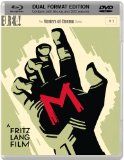Eye For Film >> Movies >> M (1931) Film Review
M
Reviewed by: Jennie Kermode

The first real serial killer film and still one of the best, Fritz Lang's urban masterpiece looks remarkably good after 83 years, the slight deterioration of the film stock simply adding to its murky atmosphere. Its story - of a child-killer and the way police and public react to him - remains as relevant as ever, and its approach is considerably more sophisticated than most modern takes on that narrative.
It begins with a song or ritual chant, a game used by children to decide who's in or out of the group, the sort of cultural artefact in which dark secrets are often preserved. The children are unconcerned; if they comprehend the murderer's actions at all, they see him simply as a force of nature, no more frightening than hunger or scarlet fever, the big killers of the time. To some of their mothers, though, the song is terrifying. Frau Beckmann (Ellen Widmann) begs them to stop singing it. Perhaps it's a premonition. Soon little Elsie Beckmann (Inge Landgut) is accepting streets from a stranger. Again, it feels as if serial murder is a predictable, inescapable part of life.

Serial murder puts the police in a difficult situation. If they can't catch the killer soon, there's a risk of serious public disorder. Already mobs are seizing hold of innocent men who just happen to speak to children in the street. Also worried are the leaders of the criminal underworld. Increased police raids ut their livelihoods at risk. Both groups set out to hunt down the murderer, but who will get him first, and is there really any hope of justice?
Though firmly centered on this narrative, Lang's film finds plenty of opportunity for social comment. There are hints at the tolerance of less lurid forms of child abuse. The speed with which the police turn their attention to particular classes of people comes under scrutiny, and sex workers assert their rights with a vigour that would be suppressed onscreen for most of the 20th century. Crucially, Lang seems to recognise organised criminality as essentially a form of feudalism, increasing in influence where the state seems ineffective; there is plenty of criticism of the mob bosses' behaviour, but there are also strong parallels draw between their approach and that of the police, especially as each group seeks to create a moral narrative to justify its proposed solutions to what it more fundamentally sees as a political and economic problem.
Ever since De Sade, murderers - especially serial killers - have been treated as somehow above the common criminal, inherently more sophisticated, the thinking man's monsters. Attacking children complicates this prevailing social narrative, but Lang is plainly aware of it when he presents us with a man whom his organised criminals directly label as other. This is reflected in Peter Lorre's portrayal of the murderer, slipping between sophistication and madness (we can see echoes of him throughout the decades to follow, from Peeping Tom to 10 Rillington Place to Changeling). Here, a Foucauldian narrative takes hold. Can he be held responsible for his actions, or is it simply that any sufficiently advanced otherness is indistinguishable from madness?
At its most basic level, M is a taut chiller, skillfully shifting audience sympathies from the children at risk to the hunted killer and back to the bereaved - but also potentially dangerous - families. Ordinary locations are made sinister by the possibility of hidden danger, whilst the children, remaining upbeat and confident, are the ones whose presence jars, telling us not just how much they depend on society for protection but how much it depends on them in order to keep believing in itself. The advance of forensic techniques since the film was made adds to the tension by making us more aware of how little the police have to work with. The world in which this story is set has grown darker, but it has not retreated; it is very much a part of who we remain today.
Reviewed on: 06 Sep 2014
















